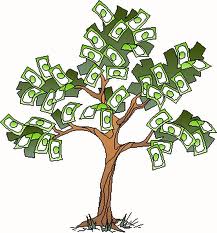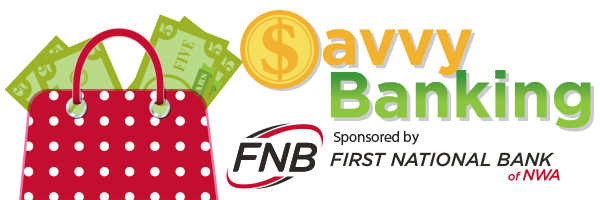Teaching kids how to handle money is one of the most important jobs parents have.
But we don’t know all the answers. That’s why we’re happy to have advice from the professionals at First National Bank for our monthly feature, Savvy Banking! David Cherry, the Commercial Services Officer and Retail Team Leader for the FNBNWA Pinnacle Branch, answers our latest money question:
Q: Our daughter is a pre-teen learning how to manage money. Should we open a savings account for her now and then eventually move to an account where she can learn to manage her own money prior to college? Do you have programs for parents to help with these types of transitions?
I’ve had the opportunity speak to many kids and parents about their financial future. Simply put, teaching your child how to save and budget their money is crucial.
I remember when I was in the fifth grade, we had a school store where we could purchase everyday school supplies (really cool school supplies). We earned “income” by completing tasks on time and of course by behaving in class. We could then use our savings to make purchases at the store. The kicker was that we had to keep track of our money with our check register. That’s right… a check register.
Today, it’s pretty rare to see someone whip out their checkbook at the store to make a purchase. The majority of consumers are using cash, or more likely a debit or credit card. The problem lies in that it’s way too simple to swipe and go, forgetting to keep track of your purchases. While banking services such as text banking and online banking are great, they don’t take the place of budgeting your spending money.
Teaching our kids how to manage money should begin at home. As a parent myself, I love watching my 5-year -old daughter struggle to make the decision on which doll to buy at the store, because she knows that she doesn’t get more money from mom and dad, and once the purchase is made, it’s final. It tells me that she understands the importance of saving her money for what she really wants. Sometimes she’ll just pass it up and move on to the next store.
If you want to teach your child about saving, opening a Minor savings account at your local bank is a great start. It’s a joint account between you and your child, but it’s their money and the account belongs to them. Bring them to the bank to make deposits and get a sucker.
 You can also set up an automatic draft to transfer money from your account to theirs each time you get paid. Even if it’s just $10. Always encourage them to save some of their birthday money or money from the tooth fairy, but don’t discourage them from spending some of it too.
You can also set up an automatic draft to transfer money from your account to theirs each time you get paid. Even if it’s just $10. Always encourage them to save some of their birthday money or money from the tooth fairy, but don’t discourage them from spending some of it too.
When your child hits fourteen you can go ahead and open a checking account. Be sure to bring in a picture ID like a school ID, passport, or a state issued ID card. Your child can be first on the account, but you are on there as well, and equally responsible for the account.
Most banks will have you sign a “Guardian Guarantee” form ensuring that you will take responsibility for monitoring the account as well as taking care of any overdrafts that may occur while they learn to manage their finances. Also know that cancelling overdraft protection won’t always prevent an overdraft. Be sure to review your monthly statement for unusual purchases or fees then get with your banker to handle any questions.
When your child turns eighteen and graduates from high school, they will begin to receive solicitations from credit card companies. “Zero percent interest for 12 months” it says. But they missed where it said the rate goes to 15.99% after the first year.
Hopefully by now your teenager understands the importance of budgeting, how to guard their credit score, and how to plan for their financial future. All because you started them on the right track early. Good job.
 David Cherry is the Commercial Services Officer and Retail Team Leader for the FNBNWA Pinnacle Branch. David has over 11 years of banking experience in every area from retail banking, lending, and business development. David lives in Fayetteville with his wife of ten years Laci, his five year old daughter Scarlett, and his two year old son Silas. Their family enjoys spending lots of time outdoors working and camping, eating dinner together, reading stories, and attending services at the Johnson Church of Christ.
David Cherry is the Commercial Services Officer and Retail Team Leader for the FNBNWA Pinnacle Branch. David has over 11 years of banking experience in every area from retail banking, lending, and business development. David lives in Fayetteville with his wife of ten years Laci, his five year old daughter Scarlett, and his two year old son Silas. Their family enjoys spending lots of time outdoors working and camping, eating dinner together, reading stories, and attending services at the Johnson Church of Christ.
Note from the mamas: Click here to read previous Q&As with First National Bank of NWA which focus on money questions like how to save for your kids’ college, how to bank from your smartphone and deciding how much house you can afford.

